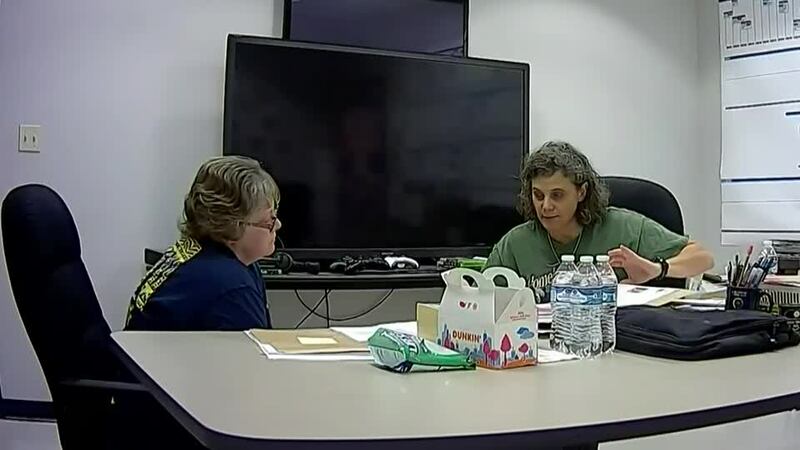PITTSBURGH — The call for help came from the Veterans Affairs hospital in Clarksburg, West Virginia in June 2018
“Our 24/7 duty line received a call from the director of the VA Medical Center there in Clarksburg, that basically indicated that there were several suspicious deaths that had occurred all surrounding severe hypoglycemic events,” said Keith Vereb, an investigator with the VA Office of Inspector General.
That was when a team of federal agents descended on the facility to find out who was behind the murders of seven elderly patients, among them a man from Westmoreland County.
So who was this person, and why were they walking into patient’s rooms and killing them with lethal doses of insulin?
“It came pretty clear to us early on that there didn’t appear to be a logical medical explanation for the events. And it came clear to us that this appeared to be most likely a malicious act,” said VA OIG agent Colin Davis.
Between 2017 and 2018, at least seven patients, all elderly men who served this country, including retired Sgt. Felix McDermott of Ruffsdale, Westmoreland County died under suspicious circumstances. An eighth patient was in critical condition. They were all in the medical center’s surgical ward, known as 3A.
Investigators suspected the patients had been injected with insulin that caused blood sugar levels to drop, ultimately leading to their deaths.
“You have no witnesses. You have no surveillance video. You have nobody confessing. Where do you go from here?” asked Target 11 Investigator Rick Earle.
“Exactly, basically compiling as much as we can, more or less the totality of the circumstances,” Vereb responded.
Investigators began interviewing nurses, doctor and staff and pulling timecards to see who had access to the patients. They also searched rooms for any potential evidence.
The evidence they gathered early on quickly pointed to a potential suspect, a nurse’s aide who started at the hospital in 2015 and worked the overnight shift.
Proving who did it and how would take more than two years. Investigators built a largely circumstantial case relying on very complex and detailed medical evidence. They started by getting consent forms from the victims’ families to exhume and examine the bodies.
“The forensic pathologist identified initially during one of the first autopsies that was done, some significant bruising in the abdomen and so subsequent testing of that tissues sample showed traces of insulin, " said Vereb
PREVIOUS COVERAGE:
Investigators consulted with experts around the world. They relied on groundbreaking new medical testing to locate injection sites on the exhumed bodies.
“That had never been done so far post-mortem in the history of the world. (The latest) on record was about a few weeks, here we were talking about six to nine months after the deaths. This case will probably take testing to the next frontier,” said Jarod Douglas, assistant U.S. Attorney.
Another medical expert from Wales provided investigators with a critical time frame for the deadly injections.
“He was able to give us a few hours and then we look and see (the nurse’s aide) is documented to be in the room with those patients,” said Douglas.
Investigators eventually narrowed down their suspect list to a former nursing assistant, Reta Mays. In addition to the mounting medical evidence, investigators also had phone calls from Mays to her husband who was in jail for failing to register as a sex offender.
Target 11 obtained the audio file and transcript of that call.
Mays: We... he had to be feed, everything. So he had no quality of life. And last week... if they would have just said, “OK, DNR (Do not resuscitate),” he would have went to sleep when his sugar dropped down to 30. He would have just went to sleep and not woke up, so.... we checked his blood sugar in the middle of the code and he was 258, so it wasn’t his blood sugar this time.”
They also had Facebook messages from Mays complaining about her job and the struggles dealing with certain patients.
They said she also searched for a serial killer online, bought the book, “I’m Dead, Now What? and watched the Netflix series “Nurses Who Kill.”
“We never really had that smoking gun, right? It was a puzzle, you put all the pieces together and it finally made the picture,” said FBI agent Ashley Archibald.
Investigators interviewed Mays three times and on multiple occasions she denied any involvement in the deaths. But after prosecutors laid out the evidence against her to her attorneys and the possibility of the death penalty if convicted, Mays, in a surprise move, pleaded guilty and avoided the death penalty.
Investigators said the families of the victims were in agreement with the plea.
“The expectation was that all of these patients were going to survive and be discharged. This was a med surge (medical surgery) ward, and it was certainly not up to Reta Mays to decide who lived and who died,” said Colin Davis, an investigator with the Veterans Affairs Office of Inspector General.
“You had eight individuals who served their country honorably deserved our respect and admiration, they went to the hospital for care, and they were callously murdered by the defendant,” said acting U.S. Attorney Randolph Bernard.
Earlier this year, Mays was sentenced to life in prison plus 20 years. She apologized to the victims’ families but never offered a motive. Her attorney in court suggested a history of mental illness, depression, PTSD and sexual trauma from her time in the military in Iraq.
In an interview with prosecutors after pleading guilty, Mays offered several possible motives.
“I think it’s really a mix of a lot of things: control, wanting to be a hero, maybe trying to convince herself that some of this was mercy,” said Douglas.
“It certainly wasn’t mercy, and it certainly wasn’t for any other reason other than ‘cold and callous’ as the judge so aptly put it. She was the monster that nobody saw coming,” said Bernard.
Mays will spend the rest of her life in federal prison. A complete top to bottom review was conducted at the hospital and a number of procedural changes were implemented as a result of this case, including restricting access to insulin.
The VA has settled wrongful death lawsuits with a number of the victims’ families.
The FBI interviews with Mays
As investigators were building a largely circumstantial case relying on interviews, medical records and time sheets, they were also closing in on a suspect.
For the first time, you will see and hear from Reta Mays in her own words as investigators turn up the heat.
The agent is sitting at a table across from Mays as the interview begins. The agent puts Mays at ease early on, sharing stories about her own life in the military, as a nurse and an FBI agent. The agent then asks Mays about her family and her job. At one point, the agent begins talking about former Pittsburgh Pirates Star Roberto Clemente, who died in a plane crash on a mission of mercy for the earthquake victims in Nicaragua, perhaps attempting to strike a nerve with Mays.
Agent: For some reason, he just had it in his head he had to help those people. And and he died as a result of it.
After a couple hours of small talk, the agent turns to the reason for the interview...The investigation into the suspicious deaths of 8 patients, all elderly man who received fatal doses of insulin, at the VA Medical Center in Clarksburg, where Mays worked the overnight shift.
The agent tells Mays there is mounting evidence pointing at her.
Agent: They looked at 1200 people, employees in the hospital and they were able to identify one person that was on the shift every single time something like that was happening.
“I think there was a lot of processing going on. I think in Miss Mays mind, I think there was a lot of curiosity. She wanted to know what we had,” said Keith Vereb, an agent with the VA Office of Inspector General in Washington.
During the interview, the agent repeatedly urges Mays to come clean.
Agent: Let’s start with the simple part. We can put Humpty Dumpty back together again. But if your heart is hard and your neck is stiff, I cannot help you.
“I can see someone thinking that you know it’s over but still cannot bring herself to admit it,” said Jarod Douglas, an assistant U.S. Attorney.
Mays remains silent for much of the interview. At one point, she is rocking back and then staring at the ceiling. Another time, she clenches her fist and then hits the table. Several times, she wipes tears from her eyes.
Then another denial.
Mays: It upset me because they think I did something that I didn’t do.
Then another one. The strongest of the entire interview.
Mays: I did not give him insulin. I have never given a patient insulin. I have never injected anyone with insulin. That I will swear on my grandchild’s life. That I have never given anyone an injection of insulin.
The agent presses on. Then Mays grabs the medical chart from her hands.
Agent: What would you say if you were the prosecutor?
Mays: Everything that you are showing me, it looks like I did it.
“I think she knew at that point, when we, she had seen what we had, the overwhelming amount, even though there wasn’t direct evidence, the overwhelming amount of circumstantial evidence that it really could not have been anybody but her,” said Ashley Archibald, an FBI agent who worked the case.
More than five hours after the interview began, Mays declares it over. She’s had enough and grabs her purse and leaves the room. The agent follows. Mays is free to go as no charges had been filed at that point.
“There were multiple instances where we thought we were that close because there...her lack of a response. She just went unresponsive for minutes on end to the point where there were several instances on the video where she was catatonic, just staring at the floor, you know, no, no response whatsoever. so right on the cusp but you know just, just couldn’t utter the words,” said Vereb.
During three interviews with the FBI, Mays never admitted any involvement. But after prosecutors agreed to withdraw the death penalty, Mays, in a surprise move, pleaded guilty to seven counts of second-degree murder and one count of attempted murder.
“Do you think she was that calculating? She thought she could get away with this?” Earle asked.
“I think she thought there was no way we could prove it, “said Archibald.
Her attorney told the judge she suffered from mental illness, depression, PTSD and sexual trauma from her time in the military. During an interview after pleading guilty, prosecutors say she admitted to the crimes and offered some possible motives.
“We are going through why and we’re going through how. She again gave us these multiple different explanations. She admitted it was part of control. She admitted her life was in chaos and that part of this was for control,” Douglas said.
Mays also suggested to prosecutors that they were mercy killings. But prosecutors don’t buy that. They say all of the patients were expected to recover and leave the hospital.
©2021 Cox Media Group










